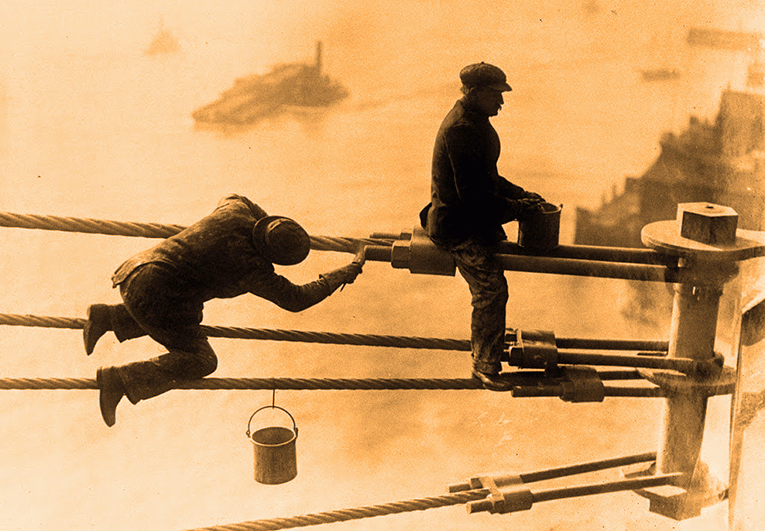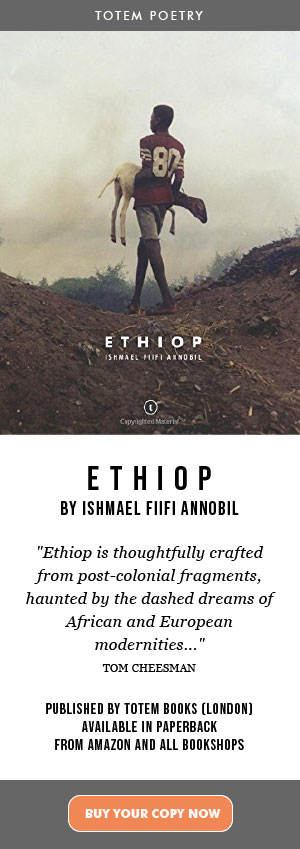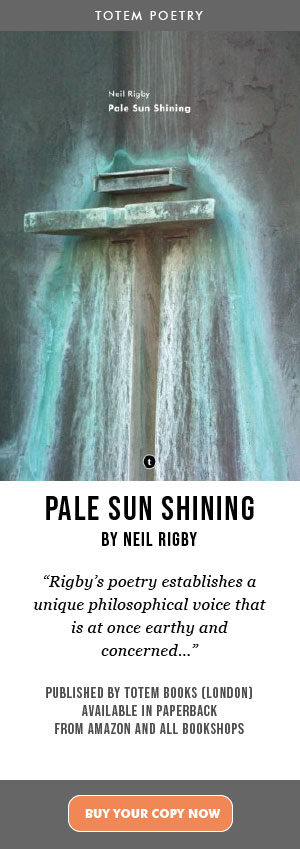Poetry & Prose : CRISPUS ATTUCKS (Part I)

(Part I)
CRISPUS ATTUCKS
By Ishmael Annobil
Crispus was drained. He’d overslept. And he hadn’t eaten much with his beer at his farewell party the night before. The mixture of sadness and joy had overwhelmed his appetite for food. Not to mention the gnawing certainty of the end of his active life. He’d come to the end of the race. He’d made it to tedium and loneliness. Slowly, but he’d made it.
Fifty five years working for the same company. He’d spent two-thirds of his life painting the Brooklyn Bridge; the bridge between two consciences, as he usually referred to it. The farewell had been a booze-up at a ramshackle bar in Other Brooklyn (or ghetto Brooklyn), replete with Cajun culinary specialities on sticks and shells, generously laid on by his absent employers. A lost looking, poppy-faced young caterer had stood by his fare like a sacrificial lamb, beckoning his equally lost clients (shocked by the gastronomical grandeur) to come and guzzle. He did so with a glistening smile. His was also the honour of making the gold watch presentation to the retiree. Such delegated powers as corporate America was so adept at, when faced with African America, never failed to amaze Crispus.
But, because he expected it, he never loathed it. Fact was, the bridge maintenance contract was as old as anthracite, just a tiny detail in his employer’s city-wide portfolio. The price had been pegged on a nineteenth century Wall Street index. So the job was only carried out for the sake of tradition, to achieve a philanthropic profile, of the heritage type. But the company was too big to need to do a ‘minority’ number to impress the NAACP anymore. Main thing was, they’d responded to Crispus’ long service record in the most appropriate and affordable way they knew. They’d got their PRO to glean for him a senior citizens treatment in the New York Times, and the old photographer (hardly paparazi material; more the community college hustings type) had captured him dangling in harness between the iron and the water of the celebrated bridge like Tensing of Everest. Such rakish pose. The zoom lens had eyed him from the prow of a River Police boat, where the white-haired photographer, looking deliberately momentous, was poised like a figurehead, while the boat’s siren unleashed honour to the old painter.
Crispus had remembered to give the camera a thumbs up, as planned, but wondered if that great American gesture would actually figure clearly in the shot. A few more showy takes (some taken while the boat circled his wavy shadow), and the great East River, heaving with oversized bass and unseen homicidal evidence, industrial crimes and hypodermic syringes and cheering river commuters and red buoys and ripped girls clothes and disgraced platform shoes, had taken the ‘showboat’ back to its moorings.
That done, Crispus had expected a deluge of wannabes and hangers-on and mayoral hopefuls at his do. In the end, only a trickle of old acquaintances and two workmates had turned up at the party. The rest were his neighbours, hardly on any terms with him at all, and only there for the free drinks and food, and full of instant filial affection towards him, and the usual juvenile, fulsome, earnest banter that he’d heard for years, wherever there was free food. He could predict it a sentence or two ahead of everyone else. He also reckoned that his bosses’ proxy praises had merely given the caterer the chance to introduce his dishes to the minorities. “This is the cycle, a motionless cycle,” Crispus had thought, referring of course to the stasis of his and his guests’ lives, when viewed against the background of so-called fast-track America – a world of eternal nouveau riche snobbery.
In retrospect, however, he felt he might have been too harsh on his ageing bosses: there had been a jazz combo from idealistic Greenwich Village, of course, because his bosses knew he loved jazz. Not from down south, but still something, he thought. But the all-caucasian group played in the exact way he hated; playing to written score, which was positioned before them the a mantra. He hated that kind of long hair, wishy-washy jazz that was swamping America with its childlike banality and planned alacrity. Crispus hated any music that lacked the true surrealism of jazz, or the pith of the soul, the deep paean and pain.
Jazz to him was the greatest victory of African American intellect and artististry. “Geniuses need no paperwork,” he’d often said (referring to the written score), each time he saw a non-African jazz combo struggling with the idiom on telly. What had sickened him most that night was the forcible, academic piety that danced on the faces of those struggling jazz aspirants. To him it indicated a fundamental fear of instinct, the inner ear. Spontaneity. Synthetic minds feared the unwritten, for they could not predict and control its flow. To Crispus, such fear stemmed from intellectual weakness and, therefore, timidity. Indeed, he blamed that timidity for all things unjust about so called ‘white’ culture. For his part, jazz made him a snob. So he had left his farewell do early to escape the grating jazz.
He sat up on his warm bed and kneaded his forehead with a grimace. He had been woken by the wailing crank two doors down the ‘war-torn’ hallway, and the meowing air conditioner. The crank, Manati Caramanca, an aging Italian former knuckle boxer, had allegedly lost his wife to a travelling salesman, who had brought her a free waterbed from a junkyard way up Canada. In his pique, Caramanca had run a knife through its middle, and that had made her day. She had gleefully called in the police to charge him with something close to malicious intent then eloped like a blue jade. Since then he’d wailed first thing every morning, hoping for the whole block to rush to his door with sympathy. Only, most of his neighbours knew no of no such pain in their personal lives to understand him, nor were they willing to last too long in their love relationships to suffer it. Crispus, one such uncommitted lover of women, had been his only comforter, maybe because they were both old.
But Caramanca had more to his personality than that. He had class, the provincial Italy kind of class that hankered after ambrosia and romance and opera and Lambroghini. He had held forth at Crispus’s farewell do, telling everyone of the good old days of prize-fighting: how he’d nearly mixed it up with ‘Lucky’ (Maciano, that is) in an exhibition bout but had been betrayed by a money grabbing sonofabitch of a manager, who had switched him for a Puerto Rican thug, just because Caramanca had refused to split the takings down the middle with him, only for the Puerto Rican to be hit by a bus the night before the fight, and how he, Caramanca, was no prostitute to get into the ring as his ringer’s ringer: forget it! And while he told his tales, he had downed Crispus’ courtesy booze swiftly, his mouth puckered suavely like a hummingbird’s. He had worn a white hand-made silk suit, made for his wedding some fifty years ago. He was re-initiating himself.
For once, Caramanca’s tired narrative had affected Crispus intensely. It placed his own life in some kind of awkward perspective for him: he, an old African stowaway without any family or housing of his own making, nor passport, was adrift in this jaded milieu, the embattled landscape of Other Brooklyn, alongside jaded Caramanca. As simple as that. The two neighbours had walked back home together, in quiet mirth, with the burly Caramanca (you dared not call him by his first name, Manati) leaning on for support, as his head swirled under the influence of free Spanish sherry and port. They had sang together in bullfrog harmony, each doing a different song, or jumping the verses of a shared one. Then, faced with the impending death of their rare joy, they had turned back to walk the entire length of the Brooklyn Bridge, and back again, for old time’s sake.
The traffic had seemed to mind them all of a sudden, giving them beeps and the ·occasional friendly holler. A black swine of a Cadillac, emerging late from the loose grit of the other-side, had strolled past then paused briefly to show the two old men a display of bare pink backsides (girls’ mostly), before racing on back to the strictures of pretence. The two astounded old men had watched in silence till Manhattan’s distant lights had swallowed and absolved those sinners, along with the saints.
All the while, a mournful nostalgia had raged in Crispus’ soul. To escape, he’d kept trying to visualise the face of Accra, the city he abandoned fifty six years ago. He had sneaked out to avoid geographical oblivion. He had been too ambitious for a rustic British colony. But the aroused night traffic wouldn’t let him escape. Neither would his shameful lose of mother tongue let him in. For once, he’d realised the importance of one’s own language; for without it, he’d thought, he couldn’t read the lips or thoughts of the faces staring at his mind’s eye – a quaint psychological discovery, he felt. His umpteenth psychological theory.
After all America had given him little distraction from thinking too much. Instead, it offered him a cocoon, a rancid cocoon, personally speaking, in which his mind could either wizard after meaning, or rot at will. He’d chosen the former. Either way, he would still rather be American (wizarding or rotting). America was the essence of his whole life’s journey. He would die for her, America. Hence his name, Crispus Attucks, borrowed from the first man to die for America – an African American, of course. But whether it was in the War of Independence or the Civil War that the man had laid down his life, he wasn’t quite sure. All that mattered was that the great warrior had been the first to shed his blood for America’s defining moment, and thus claimed a most significant political territory for African Americans, full-stop!
He would even cry for America should she suddenly fall from her peak of jingoism, though he lived a life of permanent retreat himself (from the immigration office). If America were to fall to the Japanese, for example, he would jump off this self-same Brooklyn Bridge with a barrel of paint tied to his ankles for ballast and die. Though, somewhere at the back of his sane mind, he knew the romance was a lie. He’d actually outlived it. Reality had outstripped it. He was missing home.


